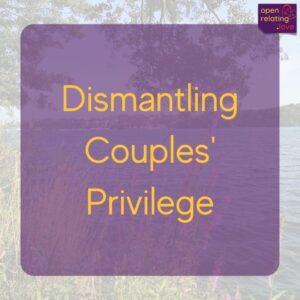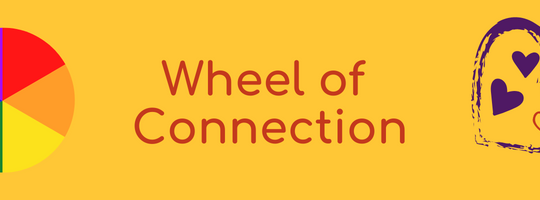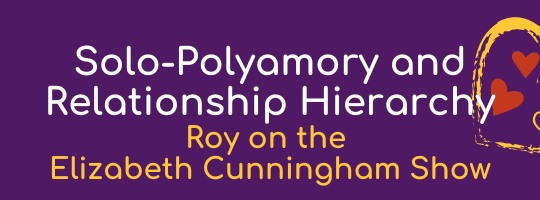Is hierarchy good or bad?
This question was inspired by one of my partners who saw an Instagram post portraying hierarchy in polyamory as something that is always inherently unethical, and rooted in colonialism. The account in question (@decolonizing.love) is dedicated to giving voice to marginalised communities within polyamory and in a broader sense, and so has a very clear and unambiguous take on hierarchy in polyamory.
Hierarchy in relationships is often unavoidable, especially in the early stages of practising multigamy. Power dynamics that affect multiple relationships, are often an outcome of hierarchy. No matter what your eventual relating dynamic becomes, if you are starting from a monogamous relationship or from having only monogamous experience in the past, there will be some level of hierarchy to address in the relationship.
Hierarchy exists, because most people are looking for their romantic relationship to provide them with the safety and security which they had (or lacked) in their caregivers’ presence. They try to ensure they get this, through creating certain rules that protect their relationship against perceived outside threats.
I personally don’t practise hierarchy in my relationships, and I totally get why it is very hard, and sometimes undesirable for people to let go of it. As with so much, it often depends on the different perspectives people have, their lived experience, trauma and attachment wounding.
I want to acknowledge that the presence of hierarchy in a relationship can have both positive and negative implications. On the one hand, it may provide a sense of stability and structure, allowing partners to navigate the complexities of multiple relationships with clarity. It can also help establish clear boundaries and expectations, ensuring that everyone involved feels comfortable and secure.
On the other hand, hierarchy can lead to feelings of inequality and resentment. It may create a power imbalance within the relationship, where one partner holds more decision-making authority or privileges than the others. This can potentially undermine the autonomy and agency of the individuals involved, causing dissatisfaction and emotional strain.
Here are some of the rules that couples often try to put in place as a means of safeguarding their relationship, leading to a hierarchical position:
- We mustn’t fall in love with anyone else
- If feelings arise, we have to cut ties with that person
- We are not allowed to sleep over at someone else’s house
- We cannot bring back anyone to our shared space
- No one can sleep or have sex in our shared bedroom
- In case of a ‘unicorn’, they must remain in relationship with both of us.
- If they don’t want to date one, then the other won’t date them
- We give each other veto power if we do not like the person that our partner is dating
- My partner is only allowed to have sex/date people of a specific gender
- Certain places, sex acts, fantasies are reserved only for the primary couple
- We will not have unprotected sex with anyone else, ever
- If we have any relationship struggles, we will close back the relationship, no matter what the status of our connection to other people
Some readers might look at this and see nothing wrong with having agreements that help me feel safe. Others will read it and become activated because they know what it feels like to be on the ‘losing’ end of such a connection. When I start an intimate connection with someone outside my ‘primary’ relationship, I may have every intention for it to be casual and non-threatening to my partner. However I can’t control what feelings arise. People sometimes fall in love in 3 dates or less. By adhering to agreements I have made, I cause pain to the new person I connected with and to myself. By refusing to follow the agreement, I cause pain to my original partner.
To build a healthy and sustainable multigamous relationship, it is crucial to have open and honest communication about hierarchy. Partners should have ongoing discussions about their desires, needs, and boundaries to ensure that everyone’s voices are heard and respected. It may involve renegotiating agreements and consciously working towards a more egalitarian dynamic even if full egalitarianism remains an (unrealised) ideal. Being realistic means admitting that agreements need to be constantly revisited and reevaluated in light of new experiences and how we change as people.
In conclusion, hierarchy cannot be simply ascribed as good or bad. Remember, every relationship is unique and there is no one-size-fits-all approach to navigating hierarchy in multigamy. The key is to prioritise consent, respect, and mutual understanding, allowing the relationship to evolve and grow in a way that feels authentic and fulfilling for everyone involved.
My hope is that everyone entering a committed relationship will intentionally evaluate, openly question and honestly discuss the ways that hierarchy shows up and how it could impact themselves and others.
-
 From Monogamy to Multigamy – opening up a relationship (Recorded Dec23)£10
From Monogamy to Multigamy – opening up a relationship (Recorded Dec23)£10 -
Product on sale
 Starter coaching package for partners (2 people)Original price was: £796.£597Current price is: £597.
Starter coaching package for partners (2 people)Original price was: £796.£597Current price is: £597. -
 Dismantling Couple’s Privilege (recorded April 2022)£10
Dismantling Couple’s Privilege (recorded April 2022)£10








[…] Here is an article about how hierarchy can lead to unhealthy power dynamics. […]